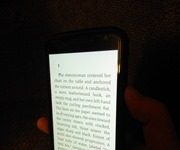 Our friends at GoodeReader posted an interesting little poll today. They surveyed over 400 people and asked them to predict how people will read in 20 years. Print? Tablet? e-Ink?
Our friends at GoodeReader posted an interesting little poll today. They surveyed over 400 people and asked them to predict how people will read in 20 years. Print? Tablet? e-Ink?
Unsurprisingly, the poll predicted that eBook technology would continue to remain popular. But what their poll did not ask is WHAT people will be reading on these devices of theirs. So here are my predictions:
1) eBook Subscription Services. I think today’s kids are going to be trained by educational websites like RAZ-Kids and TumbleBooks to view eBooks as readily available, and disposable. When you are finished with level 1, you go onto level 2 and who cares if you ever see the level 1 books again? So I predict that services like Kindle Unlimited and Scribd will grow and remain popular. I also think we’ll see a rise in specialty versions (for instance, for comic books or short reads).
2) Library books. I think is partly related to the rise of the subscription model, but it is partly also related to the changing role of libraries. I think we’ll see fewer local branches as time goes on, and the role these branches will play is already starting to change. The last time I visited my local branch, I was surprised to find they had done away with the magazines, for instance. The renovated branch seemed to be espousing a model that emphasized the community centre aspects as opposed to the books—free computer labs, event rooms you could book for studying and for workshops and so on. I think the book side of library use will shift more and more to the e-space, and the librarians at the physical branches will be there to teach study skills to kids, run workshops on resume writing, research skills and computer use, teach English classes to new immigrants and so on.
3) Web feeds. I think we’ll see a rise in services that can package the RSS feeds or Facebook news feeds of today into some sort of daily digest that is emailed automatically to your phone or device like a newspaper. I think people are increasingly leading their lives away from the computer (and to that, I say yay, I am in favour) and I am seeing more and more a push toward automation of online content. I have several apps, for instance, that can automatically save backups of themselves to Evernote. I even saw a website that can automatically suck all your Facebook pictures into a printable photo album. Just preview, edit, pay and print and you’ll get a nice photo book of your year. I expect to see more innovation of that type.
4) A return of beautiful print. I also think that people will continue to purchase print books, but I think we’ll find this limited to certain genres, and turned into more of an experience. I recently purchased two gorgeous books by cartoonist Lynda Barry, and was not at all surprised to find them unavailable in e-form. These books are basically her sketchbooks, printed and bound. Each page is a collage of words, pictures, colours, shapes…it just can’t work as an eBook. The Steampunk Lego book I recently reviewed is another example. They do make the PDF available for free with your purchase, but it just isn’t the same. I think the true book-lovers will still have a paper bookshelf in 20 years. They’ll just save it for this sort of thing.
So what do you think we’ll be reading in two more decades? I’d love to hear your comments below!

































I agree with most of what you say, but I doubt that eBook subscription services are sustainable financially unless they can figure out how to make it profitable for both the authors and the service.
Right now, the big publishers are primarily allowing their backlist on these lists, but, by the very nature of ebooks, backlist is becoming front list for series and authors with growing popularity. Once they figure this out, they will be less likely to be part of these services.
The local libraries around me continue to act as traditional libraries on top of offering those other services, and we’ve seen none of the loss of tax dollars other places have. In fact, more money is coming to improve and build new building.